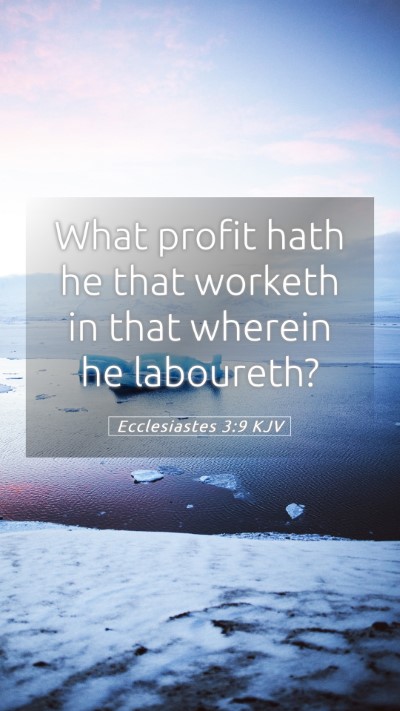Understanding Ecclesiastes 3:9
Ecclesiastes 3:9 states: “What profit hath he that worketh in that wherein he laboureth?” This verse poses a profound question about the value of human toil and its fruits. Let's delve into the meanings, interpretations, and explanations of this verse through insights gleaned from public domain commentaries.
Bible Verse Meaning
Ecclesiastes is a book that reflects on the meaning of life and the frustrations of human existence. In this context, the verse raises an essential query about the gain from labor. The Preacher (the author of Ecclesiastes) indicates a sense of futility that can accompany human efforts, especially when viewed against the backdrop of time and eternity.
Insights from Commentaries
-
Matthew Henry Commentary: Henry emphasizes that the inherent value of work is questioned here. He suggests that without divine purpose and direction, labor can feel meaningless. Here, the Preacher is inviting reflection on why we work and the ultimate outcome of our efforts.
-
Albert Barnes Notes: Barnes points out that the question reflects a greater existential despair. He notes that although man toils, what does he truly gain from his hard work? This passage underscores a tragic reality that even the most diligent efforts may yield little satisfaction or lasting results.
-
Adam Clarke Commentary: Clarke adds that the verse could suggest that despite strenuous labor, one may not reap the rewards one expects. He discusses how temporal pursuits often lead to dissatisfaction when they are not founded upon spiritual truths. Clarke finds a deeper meaning in recognizing that real profit comes from aligning one’s labor with the will of God.
Spiritual Insights
The crux of Ecclesiastes 3:9 speaks to the quest for meaning in human activity:
- Reflection on Purpose: It prompts the believer to ponder whether their work aligns with God’s purpose. Are we toiling merely for earthly success, or are we contributing to a greater divine plan?
- Value of Labor: It encourages us to see our work as meaningful when it's infused with faith and driven by a sense of divine calling.
- Temporal vs. Eternal: It serves as a reminder to prioritize eternal values over temporal gains, aligning our pursuits with what truly lasts.
Application of the Verse
Understanding this verse can influence how we approach our daily work:
- Incorporate faith into your work life, ensuring that what you do is meaningful and impactful.
- Seek to balance ambitions with spiritual pursuits, recognizing the importance of eternal perspectives.
- Engage in community and service projects that reflect God’s love and purpose, turning efforts into acts that render eternal value.
Cross-References
This verse echoes sentiments found in other parts of Scripture:
- Proverbs 16:3: “Commit thy works unto the LORD, and thy thoughts shall be established.”
- Ecclesiastes 2:22-23: “For what hath a man of all his labor, and of the vexation of his heart?”
- Colossians 3:23-24: “And whatsoever ye do, do it heartily, as to the Lord, and not unto men.”
Conclusion
In summation, Ecclesiastes 3:9 compels believers and seekers alike to evaluate the significance of their labor. Through theological insights, it sheds light on the importance of aligning work with divine purpose, fostering a rich understanding that transcends mere productivity and embraces spiritual growth. Engaging in this inquiry can greatly enhance Bible study insights and facilitate deeper biblical exegesis.


